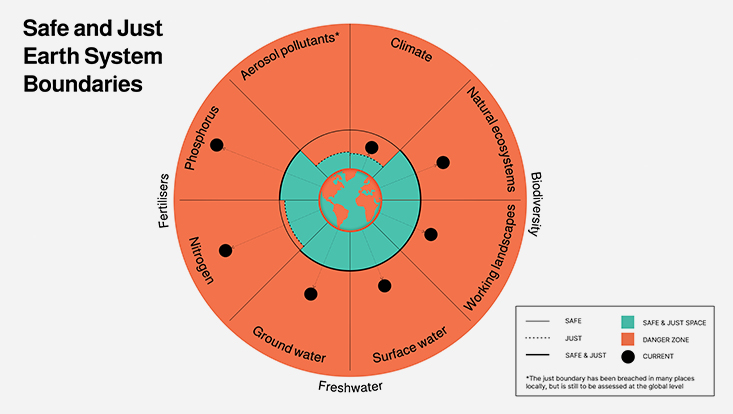Safe and just Earth System Boundaries (ESB)A just world on a safe planet: Study quantifies Earth system boundaries for the first time
17 July 2023, by Website Team Biologie

Photo: The Earth Commission
A new study by the Earth Commission, published in the journal Nature, reveals that humanity is taking significant risks with the future of civilization and the planet. An international science team of more than 40 researchers, including Dr. Awaz Mohamed from the Department of Biology, has for the first time quantified safe and equitable Earth system boundaries at global and subglobal scales for various biophysical processes and systems. These boundaries, which govern the state of the Earth system, have previously been used primarily to assess the maintenance of the Earth's livelihood and stability. Now, for the first time, safety and justice for humanity is evaluated and quantified for the same control variables regulating life support and Earth stability.
The study emphasizes that considering equity and minimizing exposure to significant harm to people worldwide is leading to more stringent Earth System Boundaries and has calculated safe and equitable boundaries for several domains. “We scientifically quantified limits for climate, freshwater, biodiversity, nutrients, and aerosol pollutants that delineate a safe and just space for people and the planet. Staying within ESBs is crucial for a stable and resilient planet, and equitable resource access necessary for a dignified life; exceeding these boundaries, even temporarily for some of the boundaries, can cause irreversible harm to life”, says Dr. Awaz Mohamed from the research unit Functional Forest Ecology. Regrettably, most of these boundaries have already been exceeded. Human activities have already altered water systems, protected areas and natural areas are severely degraded, and millions of people are already affected by the impacts of climate change. This poses a major challenge and requires urgent change to avoid irreversible tipping points and far-reaching impacts on human well-being.
The results of the study have far-reaching implications. It becomes clear that, in addition to climate change, there is a need to control other biophysical systems and processes that are of great importance to human well-being. The researchers emphasize that a secure and equitable future requires a holistic and transformative approach. It is not only important to establish safe and equitable boundaries, but also to develop equitable transformation processes to ensure adequate access to resources. The study provides scientific impact limits that can be used to guide the setting of new goals for businesses, cities, and governments. These targets should aim to measure and improve impacts on people and the planet, while respecting the planet's finite Earth system limits.
The authors emphasize the urgency of collective action by governments and corporations to respect the limits of the Earth system and keep our life-support system intact. They emphasize the responsibility for the global commons and the opportunity to create a better future for people and the planet by developing science-based goals. These goals can be adopted by various stakeholders to address the global crises of climate change, biodiversity loss, nutrient overload, overuse of water, and air pollution, and to create a safe and just world for future generations.
The Earth Commission is part of the international research program Future Earth and cornerstone of the Global Commons Alliance.
Original publication
Rockström, J., Gupta, J., Qin, D. et al. Safe and just Earth system boundaries. Nature (2023) 619, 102–111

